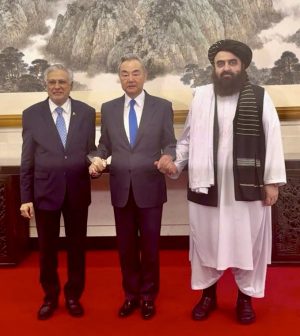China, Afghanistan, and Pakistan are scheduled to hold an informal meeting in Kabul on August 20. The foreign ministers of Pakistan and China – Ishaq Dar and Wang Yi, respectively – along with the Taliban’s Acting Foreign Minister Amir Khan Muttaqi will convene to discuss trilateral issues.
Muttaqi had been scheduled to travel to Pakistan earlier this month, on August 5, but his visit was canceled, with both countries citing technical reasons. Sources suggest that the United Nations Security Council (UNSC) prevented Muttaqi from traveling because he is still on the list of U.N.-designated Taliban members. This might have added extra motivation to hold the upcoming trilateral meeting in Kabul, although it was already planned for that location.
A previous meeting of the three foreign ministers was held in Beijing on May 21. According to China’s Ministry of Foreign Affairs, during that meeting, “the three foreign ministers spoke positively about the outcomes of the China-Afghanistan-Pakistan Foreign Ministers’ Dialogue and engaged in a friendly and in-depth exchange of views on further utilizing the potential of the trilateral mechanism to advance mutually beneficial cooperation.”
During the last trilateral meeting both, “Afghanistan and Pakistan expressed clear willingness to elevate diplomatic relations and agreed in principle to exchange ambassadors as soon as possible” in order “to strengthen exchanges and diplomatic contacts.” This expression of interest by both countries resulted in Pakistan upgrading its diplomatic relations with the Taliban. This move can be partly attributed to the Taliban’s growing closeness to India. However, Dar also explicitly stated that the upgrade in Pakistan’s ties with the Taliban was made at Beijing’s request.
China has played a significant role in de-escalating tensions between Pakistan and the Taliban regime. This upcoming trilateral meeting is thus expected to strengthen not only the ties between Pakistan and Afghanistan but also the overall cooperation among the three countries. The informal meeting in Kabul will focus on efforts to combat terrorism and the expansion of the Belt and Road Initiative (BRI) into Afghanistan through the China-Pakistan Economic Corridor (CPEC).
Counterterrorism is a top priority for all three countries. During the last meeting, their foreign ministers agreed “to oppose all forms of terrorism, carry out law enforcement and security cooperation, jointly combat terrorist forces of concern to each side, and stay vigilant against external interference in the internal affairs of regional countries.”
Yet counterterrorism is also a source of discord due to accusations of cross-border terrorism. According to a recent U.N. report, Afghanistan continues to provide a safe haven for terrorist organizations. The Islamic State Khorasan Province (ISKP) – which poses a security threat to Taliban rule in Afghanistan, as well as eyeing attacks on other countries – is active in the country. So too are al-Qaida and its affiliated groups, such as the Tehreek-e-Taliban Pakistan (TTP), which is engaged in terrorist activities within Pakistan – and, more controversially, these groups are alleged to enjoy Taliban support.
China has similar concerns regarding counterterrorism, claiming that Uyghur militants might use Afghan territory to launch attacks against China. Consequently, China wants Afghanistan to take action against these militants. However, due to the historical ties between the Taliban and Uyghur militants, the Taliban regime has been reluctant to do so. China also has a stake in Pakistan’s fight against terrorism, as attacks by the TTP and Baloch militant groups openly target CPEC projects involving Chinese investment and Chinese nationals.
In addition to counterterrorism, Afghanistan’s involvement in the BRI will also be a key topic of discussion at the meeting. China has long sought to incorporate Afghanistan into its BRI. China signed a Memorandum of Understanding with the previous Afghan government in 2016 to enhance cooperation under this initiative, but not much progress has been made in this regard. Given China’s interests in Afghanistan’s resources, the BRI’s extension to the country is essential for Beijing, and linking Afghanistan to CPEC would be the optimal route.
The inclusion of Afghanistan in CPEC would also be beneficial for the Taliban regime. According to the Taliban’s Deputy Minister of Economy Abdul Latif Nazari, “Afghanistan’s participation in CPEC could play a significant role in job creation, reducing unemployment, strengthening infrastructure, attracting investment, and boosting regional cooperation.” The three countries announced that they had agreed to link Afghanistan to CPEC at their May foreign ministers meeting.
For the Taliban regime, which is currently facing sanctions and is relatively isolated, Afghanistan’s inclusion in CPEC could significantly enhance trade and investment in the country. This development may further strengthen the Taliban’s de facto governance over Afghanistan and help ease tensions between Afghanistan and Pakistan. However, it remains uncertain when China will officially sign the agreement to incorporate Afghanistan into the BRI through CPEC, as well as under what conditions Pakistan will agree to this arrangement. Given that Beijing has successfully encouraged Islamabad to improve its diplomatic relations with the Taliban, it may also effectively facilitate the extension of CPEC into Afghanistan without much objection from Pakistan. But even then, implementing projects on the ground in Afghanistan has always proved difficult.
The upcoming trilateral meeting is expected to be beneficial for all three parties involved, particularly for the Taliban regime. This meeting will allow the Taliban to host a multilateral discussion despite its ongoing international isolation, which is especially poignant given the timing: days after the anniversary of its takeover of Kabul in August 2021. Given the international pressure, financial sanctions, and asset freezes, this trilateral meeting in Kabul could provide a significant political boost for the Taliban. If the meeting results in the formal extension of CPEC into Afghanistan, building on the verbal agreement reached in May, it would mark another victory for the Taliban’s de facto regime.

































